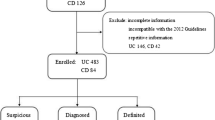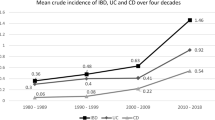Abstract
Background
The incidence of inflammatory bowel disease (IBD) is increasing in East Asia; however, population-based data from this region are lacking.
Aim
We conducted a nationwide, population-based study to examine the incidence and disease course of IBD in South Korea.
Methods
Using the National Health Insurance claims data, we collected data on patients diagnosed with IBD [10,049 with ulcerative colitis (UC) and 5595 with Crohn’s disease (CD)] from 2011 to 2014.
Results
During the study period, the average annual incidence of UC was 5.0 per 105, while that of CD was 2.8 per 105. Among patients with UC, the cumulative rates of surgery 1 and 4 years after diagnosis were 1.0 and 2.0%; those among patients with CD were 9.0 and 13.9%, respectively. The 1- and 4-year cumulative rates of moderate- to high-dose corticosteroid use were, respectively, 26.6 and 45.2% among patients with UC, and 29.9 and 50.8% among those with CD. Similarly, the 1- and 4-year cumulative rates of immunomodulator use were 14.1 and 26.4% among patients with UC, and 58.3 and 76.1% among those with CD, respectively. With regard to biologic use, the 1- and 4-year cumulative rates were 3.0 and 9.0% among patients with UC, and 11.1 and 31.7% among those with CD, respectively.
Conclusions
The recent incidence of IBD in South Korea has been the highest in East Asia. Patients who had been diagnosed recently with IBD showed lower rates of surgery and higher rates of immunomodulator and biologic use compared to those reported ever in South Korea.





Similar content being viewed by others
References
Molodecky NA, Soon IS, Rabi DM, et al. Increasing incidence and prevalence of the inflammatory bowel diseases with time, based on systematic review. Gastroenterology. 2012;142:46–54.e42. (quiz e30).
Thia KT, Loftus EV Jr, Sandborn WJ, et al. An update on the epidemiology of inflammatory bowel disease in Asia. Am J Gastroenterol. 2008;103:3167–3182.
Ng WK, Wong SH, Ng SC. Changing epidemiological trends of inflammatory bowel disease in Asia. Intest Res. 2016;14:111–119.
Prideaux L, Kamm MA, De Cruz PP, et al. Inflammatory bowel disease in Asia: a systematic review. J Gastroenterol Hepatol. 2012;27:1266–1280.
Ng SC, Tang W, Ching JY, et al. Incidence and phenotype of inflammatory bowel disease based on results from the Asia-pacific Crohn’s and colitis epidemiology study. Gastroenterology. 2013;145:158–165.e152.
Kim HJ, Hann HJ, Hong SN, et al. Incidence and natural course of inflammatory bowel disease in Korea, 2006–2012: a nationwide population-based study. Inflamm Bowel Dis. 2015;21:623–630.
Park SH, Kim YM, Yang SK, et al. Clinical features and natural history of ulcerative colitis in Korea. Inflamm Bowel Dis. 2007;13:278–283.
Ng SC. Epidemiology of inflammatory bowel disease: focus on Asia. Best Pract Res Clin Gastroenterol. 2014;28:363–372.
Satsangi J, Silverberg MS, Vermeire S, et al. The Montreal classification of inflammatory bowel disease: controversies, consensus, and implications. Gut. 2006;55:749–753.
Yang SK, Yun S, Kim JH, et al. Epidemiology of inflammatory bowel disease in the Songpa-Kangdong district, Seoul, Korea, 1986–2005: a KASID study. Inflamm Bowel Dis. 2008;14:542–549.
Sood A, Midha V, Sood N, et al. Incidence and prevalence of ulcerative colitis in Punjab, North India. Gut. 2003;52:1587–1590.
Singh P, Ananthakrishnan A, Ahuja V. Pivot to Asia: inflammatory bowel disease burden. Intest Res. 2017;15:138–141.
Loftus EV Jr, Sandborn WJ. Epidemiology of inflammatory bowel disease. Gastroenterol Clin N Am. 2002;31:1–20.
Leong RW, Lau JY, Sung JJ. The epidemiology and phenotype of Crohn’s disease in the Chinese population. Inflamm Bowel Dis. 2004;10:646–651.
Jiang XL, Cui HF. An analysis of 10218 ulcerative colitis cases in China. World J Gastroenterol. 2002;8:158–161.
Park SJ, Kim WH, Cheon JH. Clinical characteristics and treatment of inflammatory bowel disease: a comparison of Eastern and Western perspectives. World J Gastroenterol. 2014;20:11525–11537.
Bernstein CN, Wajda A, Svenson LW, et al. The epidemiology of inflammatory bowel disease in Canada: a population-based study. Am J Gastroenterol. 2006;101:1559–1568.
Vind I, Riis L, Jess T, et al. Increasing incidences of inflammatory bowel disease and decreasing surgery rates in Copenhagen City and County, 2003–2005: a population-based study from the Danish Crohn colitis database. Am J Gastroenterol. 2006;101:1274–1282.
Jiang L, Xia B, Li J, et al. Retrospective survey of 452 patients with inflammatory bowel disease in Wuhan city, central China. Inflamm Bowel Dis. 2006;12:212–217.
Ng SC, Zeng Z, Niewiadomski O, et al. Early course of inflammatory bowel disease in a population-based inception cohort study from 8 countries in Asia and Australia. Gastroenterology. 2016;150:86–95.e83. (quiz e13-84).
Frolkis AD, Dykeman J, Negron ME, et al. Risk of surgery for inflammatory bowel diseases has decreased over time: a systematic review and meta-analysis of population-based studies. Gastroenterology. 2013;145:996–1006.
Lee HS, Park SH, Yang SK, et al. Long-term prognosis of ulcerative colitis and its temporal change between 1977 and 2013: a hospital-based cohort study from Korea. J Crohns Colitis. 2015;9:147–155.
Park SH, Yang SK, Park SK, et al. Long-term prognosis of Crohn’s disease and its temporal change between 1981 and 2012: a hospital-based cohort study from Korea. Inflamm Bowel Dis. 2014;20:488–494.
Rungoe C, Langholz E, Andersson M, et al. Changes in medical treatment and surgery rates in inflammatory bowel disease: a nationwide cohort study 1979–2011. Gut. 2014;63:1607–1616.
Chhaya V, Saxena S, Cecil E, et al. Steroid dependency and trends in prescribing for inflammatory bowel disease—a 20-year national population-based study. Aliment Pharmacol Ther. 2016;44:482–494.
Lakatos PL, Golovics PA, David G, et al. Has there been a change in the natural history of Crohn’s disease? Surgical rates and medical management in a population-based inception cohort from Western Hungary between 1977–2009. Am J Gastroenterol. 2012;107:579–588.
Ramadas AV, Gunesh S, Thomas GA, et al. Natural history of Crohn’s disease in a population-based cohort from Cardiff (1986–2003): a study of changes in medical treatment and surgical resection rates. Gut. 2010;59:1200–1206.
Schnitzler F, Fidder H, Ferrante M, et al. Mucosal healing predicts long-term outcome of maintenance therapy with infliximab in Crohn’s disease. Inflamm Bowel Dis. 2009;15:1295–1301.
Colombel JF, Rutgeerts P, Reinisch W, et al. Early mucosal healing with infliximab is associated with improved long-term clinical outcomes in ulcerative colitis. Gastroenterology. 2011;141:1194–1201.
Burger D, Travis S. Conventional medical management of inflammatory bowel disease. Gastroenterology. 2011;140:1827–1837.e1822.
Reinisch W, Reinink AR, Higgins PD. Factors associated with poor outcomes in adults with newly diagnosed ulcerative colitis. Clin Gastroenterol Hepatol. 2015;13:635–642.
Billiet T, Ferrante M, Van Assche G. The use of prognostic factors in inflammatory bowel diseases. Curr Gastroenterol Rep. 2014;16:416.
Dias CC, Rodrigues PP, da Costa-Pereira A, et al. Clinical prognostic factors for disabling Crohn’s disease: a systematic review and meta-analysis. World J Gastroenterol. 2013;19:3866–3871.
Lee HS, Choe J, Lee HJ, et al. Change in the diagnosis of inflammatory bowel disease: a hospital-based cohort study from Korea. Intest Res. 2016;14:258–263.
Acknowledgments
This research was supported by two Grants (A120176 and HI13C1345) from the Korean Health Technology R&D Project of the Korean Health Industry Development Institute (KHIDI), which is funded by the Ministry of Health and Welfare of the Republic of Korea. We also received two Grants (NRF-2013R1A2A2A01067123 and NRF-2014R1A1A1008096) from the Basic Science Research Program of the National Research Foundation of Korea, which is funded by the Ministry of Science, ICT, and Future Planning. Finally we were provided with a Faculty Research Grant (2012-31-0477) from the Department of Internal Medicine, Yonsei University College of Medicine.
Author information
Authors and Affiliations
Corresponding authors
Ethics declarations
Conflict of interest
The authors declare that they have no conflict to interest.
Rights and permissions
About this article
Cite this article
Jung, Y.S., Han, M., Kim, W.H. et al. Incidence and Clinical Outcomes of Inflammatory Bowel Disease in South Korea, 2011–2014: A Nationwide Population-Based Study. Dig Dis Sci 62, 2102–2112 (2017). https://doi.org/10.1007/s10620-017-4640-9
Received:
Accepted:
Published:
Issue Date:
DOI: https://doi.org/10.1007/s10620-017-4640-9




